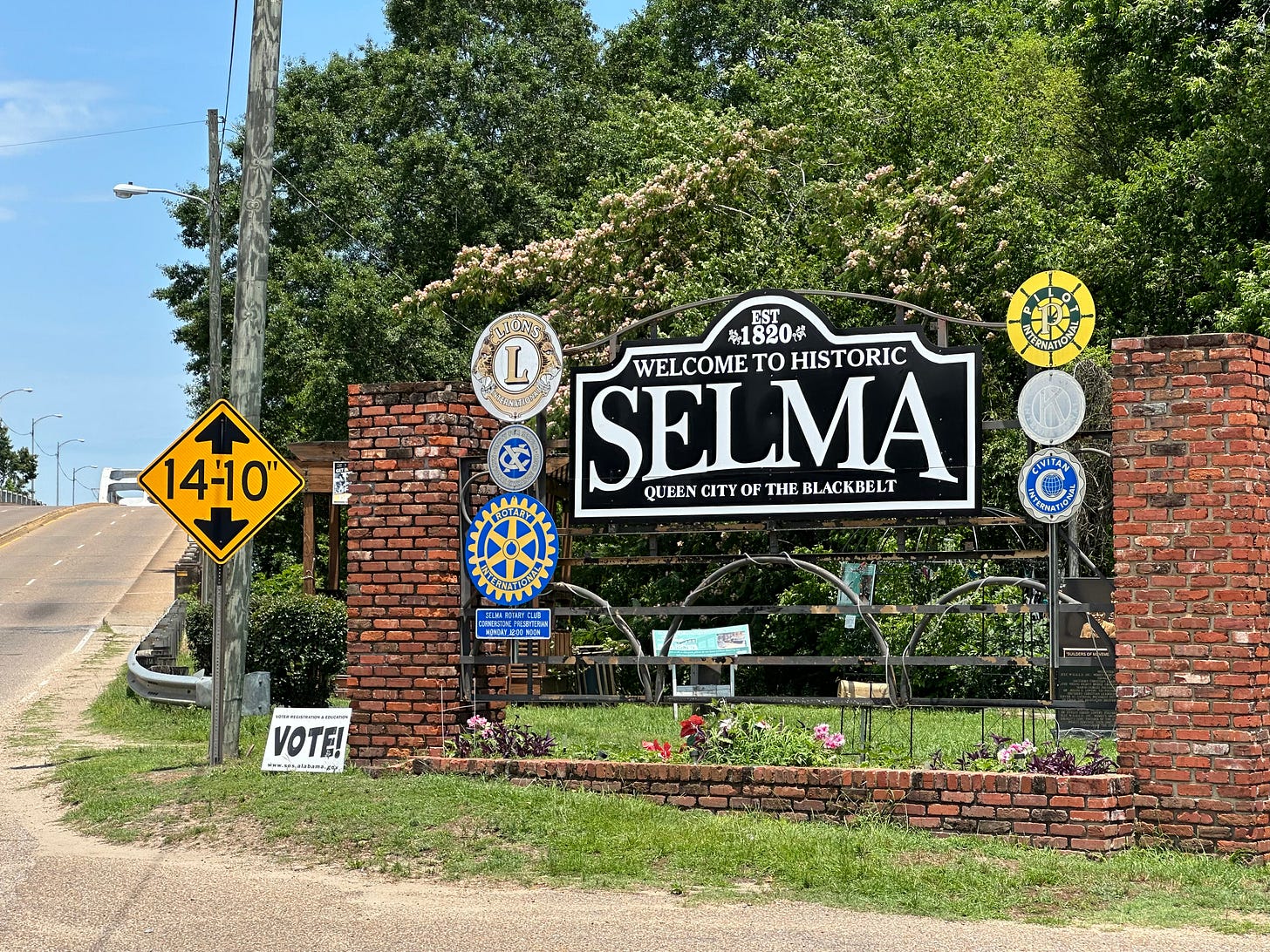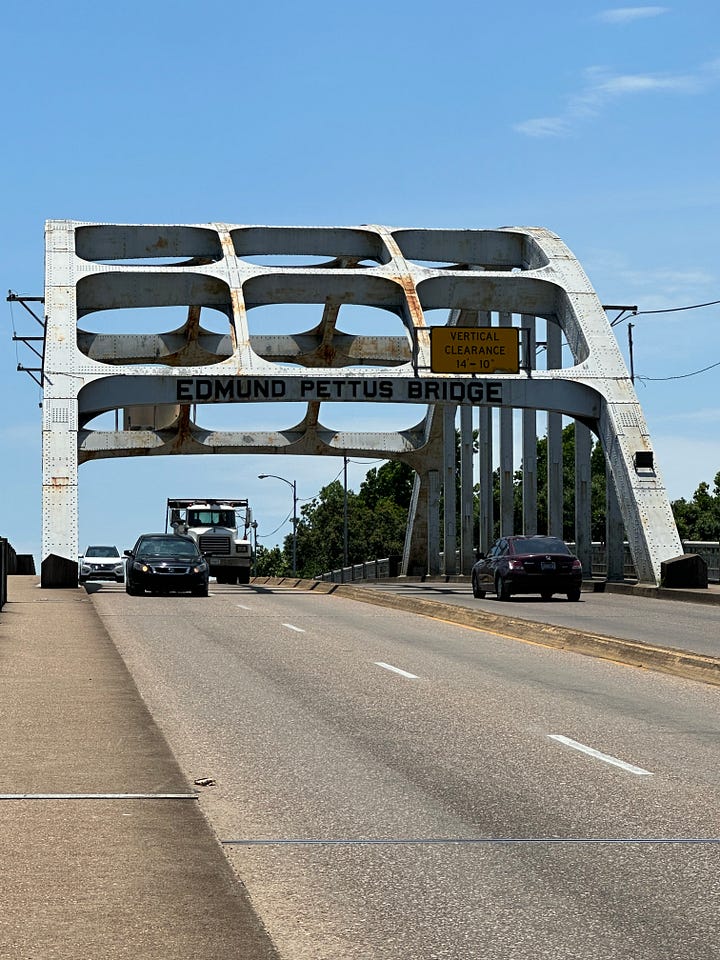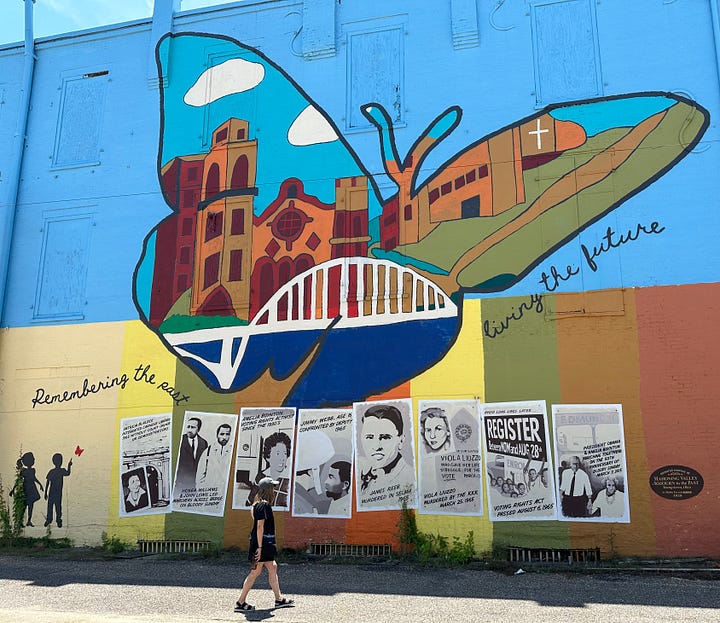Earlier this month, I went down to Alabama to spend a few days touring civil rights sites with high school friends and their partners, a trip beautifully organized by my dear friend Joyce, Birmingham resident and booster, and curator of similar trips for foundations and nonprofits. Our itinerary was jam-packed with three full days in Montgomery, Selma, and Birmingham, and it will take some time before I am able to process all that we learned and experienced.
In sharing the information and emotions gathered during this journey, there are multiple threads I could pull on: the horror and beauty of the Equal Justice Initiative’s National Memorial for Peace and Justice honoring victims of lynching; my connection to Montgomery through my paternal grandmother’s family who settled there and in nearby Columbus, Georgia in the mid 19th century; and the effort to reclaim Black history as integral to American history being championed by Lisa McNair, whose older sister Denise was killed in the bombing of Birmingham’s 16th Street Baptist Church, to name a few.
In Selma, we visited Tabernacle Baptist Church where the first mass meeting for voting rights was held in 1963. We walked across the Edmund Pettus Bridge where John Lewis and dozens of others were beaten on that bloody Sunday in 1965. We reviewed the ridiculous questions on the literacy test designed to keep Black voters from registering. (Do you know many bubbles are in a bar of soap? Or how a county seat could be changed under the Alabama Constitution?) En route from Montgomery, we passed by the grave of Viola Liuzzo, a woman from Detroit shot down on the highway by three members of the Ku Klux Klan while ferrying marchers back to Selma after they reached Montgomery.

None of these stories was news to me but being there was sobering all the same. Plus it made me want to put all the disaffected Democrats (particularly young people and voters of color) on a bus to Alabama to remind them of the years-long hard work of organizing and the suffering endured for the right to vote. Hearing U.S. Rep. Byron Donalds falsely claiming that Black people voted conservatively during Jim Crow was just icing on the cake.
So here I will be overtly and unapologetically partisan. You may not love Joe Biden and you may even be deeply disappointed by him. But you must at least exercise your franchise to vote against Donald Trump, the authoritarian future he envisions, and the cadre of horrible people he would bring with him to the White House and elsewhere in the federal government. If you live in a state with a U.S. Senate race, all the more reason to go to the ballot box and pull the lever for a Democrat who can, at worst, act as a check on a second Trump presidency, or at best, help a second term Joe Biden pass the rest of his progressive agenda. And if you are thinking of going third party, a protest that will have zero practical effect, think of the people in Selma and elsewhere who put their lives on the line for voting rights. Honor their memory and sacrifice by voting blue.




As a final note, even if you think you know all the details of what happened in Selma, I highly recommend listening to the first season of NPR’s White Lies podcast. The seven episodes focus on the murder of Rev. James Reeb while also focusing on the systems of violence and oppression that enabled this crime to go unpunished.




Anne, I just learned on a Historic Chevy Chase DC walking tour a couple weekends back that James Reeb was living in a house in Chevy Chase, I believe at the time he died. I had no idea.
Beautiful commentary on the importance of voting in November for a future that builds on the work and sacrifices of the people you remembered on your trip. During the. 60s, the Johnson Foundation sent a group of university of Wisconsin students (of which I was one) to the South during the time of such turmoil and hatred. Burned into my memory...I would like to go back some day. Maybe your tour guide is a place to start. Thank you for your weekly commentary. I look forward to each one.